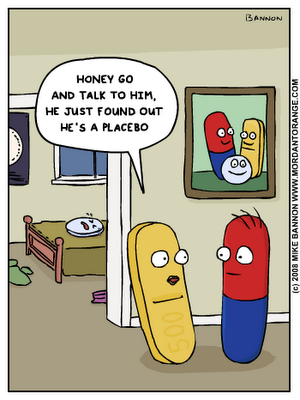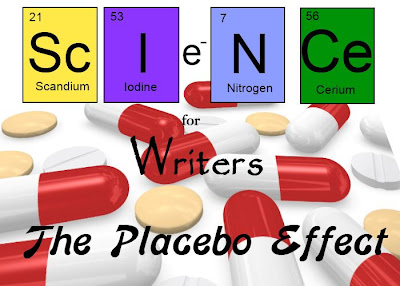Welcome to the third Science for Writers post. Last week we discussed Taxonomy. This week we are entering the realm of medical science and with a discussion on the weird phenomena that is the Placebo Effect.
I have put important words in bold. These words are important in medical science and I will refer to them throughout the post. It isn't overly important for you to know the exact meaning, so long as you get the gist of what I'm talking about you will be fine following this post.
Writing Links are in italics and these discuss how the science could be used in writing.
A bit of background science
Pavlov's dog is likely something you have heard of. To summarise this experiment will help understand the rest of this post.
The experiment goes that Ivan Pavlov would ring a bell and present food to his dog. He would do this time and time again, repeating the experiment so that eventually when he rang the bell the dog would salivate without the bell.
The key point here is that the dog was conditioned to salivate without the presence of food simply by hearing an external stimuli, like a bell. The video below goes into a bit more detail behind how Pavlov came to his conclusions and is worth a watch.
Writing Link: This idea is known as conditioning. Could you apply this in your own writing? On a far larger scale you could use this as a way of getting rid of armies. You could have a canon fire every time troops attacked the enemy from behind. Keep doing this enough times and you could divert the enemy simply by firing the canon. When the canon is fired the enemy turn to face the expected attackers. Only this time there aren't any. You rush them from the front beating them into a hasty retreat. I don't know if it would work with massive armies, but small groups may work.
The Placebo Effect
So what exactly is this Placebo Effect?
In essence it is where you expect to get better, so you do. A common example is a sugar pill that you think is a proper tablet. What happens is you genuinely believe you are taking a pill that will clear your headache and your headache is gone within hours. The tablet you took was made out of sugar and medically has no effect on your headache. And yet, your headache did clear.
Another example of the placebo is the kindly doctor scenario. This is where simply going to see a nice doctor and going through the procedures and tests can make you feel better.
Another example of the placebo is the kindly doctor scenario. This is where simply going to see a nice doctor and going through the procedures and tests can make you feel better.
Writing Link: Is it ethical to prescribe a placebo even if it does cure the patient? A good plot for a story line could be a doctor who's career is based on lies. He is fake, no degree, but has a very good track record. This character could be someone who has learnt exactly what makes patients feel better without having to know a thing about medicine. A kind-hearted man who only takes on patients he can deal with in this manner. But what if one day he gets a patient who he can't cure simply with charm and sugar pills? Will he come clean? Will he be exposed? Will he succeed? How would you make a readers empathetic towards a character who is based on lies?
There are several competing theories as to why the placebo effect works. I'll go through a couple now.
Psychological
 |
| Placebo Comic Courtesy of Todayifoundout |
This theory works on what is known as the subject-expectancy effect. This is where people know what they are to expect from the treatment and so feel it. The reason they feel it is because they sub-consciously change their reaction which in turn brings about a result. Another result of this theory is the patient says they feel the result even if they don't. It is like knowing the answers to a test before you sit it. Even if you don't get the same answer, you think what you were told is right so put it down anyway.
This links back to Pavlov's dog. Humans have been conditioned to believe medicine prescribed by a doctor will ease our pain or cure our ailment. This is hard-coded into our minds that sometimes simply ringing the bell (taking a pill) can make us salivate (get better).
Here is a quote from How Stuff Works:
In a 2002 study conducted by researchers at the UCLA Neuropsychiatric Institute, two groups of patients received experimental antidepressants, while the third was given a placebo. After several weeks of taking pills, each group's brain activity was measured using electroencephalography (EEG). The patients who had been on the placebo and reported a positive effect showed a greater increase of brain activity than those who had responded well to the drug. That activity was also centered in a different area of the brain, the prefrontal cortex [source: Leuchter]. The outcome of the UCLA study suggests that the brain isn't being "fooled" by a placebo after all -- it actually responds in a different way to a drug and a placebo.Writing Link: If just expecting a response is sometimes enough to cause a response imagine the possibility of exploitation. In a fantasy/sci-fi world there may be a drug that allows someone to take over your mind. If this drug was falsely branded as a pain reliever and people took it expecting pain relief and so got pain relief (even though medically it shouldn't) then they would go back and take it again next time they have pain. Then the evil mastermind can have complete control over a large number of people.
Evolution
The fact that people can cure themselves of minor infections or pain on their own simply by thinking they can begs an important question: why do we have to take a pill for this to happen, why not just think ourselves better without the sugar pill placebo?
Well research suggests it might all be evolutionary.
Here is a quote from New Scientist
the immune system is costly to run - so costly that a strong and sustained response could dangerously drain an animal's energy reserves. In other words, as long as the infection is not lethal, it pays to wait for a sign that fighting it will not endanger the animal in other ways.
What this is saying is that when the conditions are such that it is safe to expend energy for the immune system to heal us then the body will do so. Taking a pill, the article later suggests, tells our bodies that it is getting help. The pill makes us think that the infection is weakened meaning our body can fight the infection with more energy, but over a shorter period of time. In reality the pill has done no such thing, but it has, in a way, activated the immune system.
But we live in a safe environment. Why then, don't we mount this response sooner? Well, whilst our bodies and in many ways our conscious mind have adapted to this modern, safe world with a good food supply, our sub-conscious and immune system have not.
Writing Link: It seems much of what we learn about placebos can make really good antagonists in fiction. What if an enemy infiltrated the medical team of an army. What if the army didn't have a strong food supply and need to conserve energy? If they are prescribed medicine they think will work but is actually a placebo, then the immune system will use energy that should be conserved, thus weakening the patient further. Apply this to a whole army and the enemy has a good opportunity to attack.
A word on Nocebo
The Nocebo effect is the Placebo's evil twin. Where the placebo means you can 'think yourself better', the nocebo makes you 'think yourself ill'.
This follows the psychological theory of the placebo effect. If you give someone a sugar pill and tell them it will cure their cold but will likely cause headaches then guess what will happen? Their cold will go and they will get a headache.
Sadly not as much research has gone into the nocebo as the placebo. Sure the placebo effect can make people feel better, but understanding the nocebo effect would allow us to better understand anxiety and depression - illnesses that can work simply because the person thinks they will be depressed by something, or thinks a situation will make them anxious. The reason for the small amount of research is ethics. Turns out it is hard to get funding when the trials make people feel worse.
Read this example from New Scientist:
In the 1970s, for example, doctors diagnosed a man with end-stage liver cancer, and told him he had just a few months to live. Though the patient died in the predicted time, an autopsy showed the doctors had been mistaken. There was a tiny tumour, but it had not spread. It seemed the doctors' prognosis had been a death curse.
This is a remarkable, and sad story. The doctor was wrong, but right. The patient had no cancer. The patient was not terminally ill. Yet he died in the prescribed time. He thought he was going to die and so did. Is this somebody thinking themselves to death?
Writing Link: Apply the previous writing link scenarios to the nocebo effect and see what sinister evil plans you can think of.
So that's it for this week. I hope this was of interest to you. If you are interested in an article related to the placebo effect try one of these:
Please comment, +1, share, like, tweet, stumble, pin, or whatever social interaction you want if you found this post interesting. Please post in the comments below any science you'd like explaining in a future Science for Writers post.
Thanks
Matt B

No comments:
Post a Comment